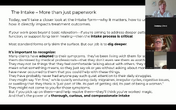Why Self Cultivation?
Self Cultivation
The practice of managing your own energy will keep you from experiencing burnout, help you to build strong and healthy boundaries, and make you more sensitive and receptive to sensing the condition of your clients meridians and energy systems.
Qi Gong is one of the earliest forms of self cultivation. It was developed specifically for this purpose. Medical Qi Gong is a therapeutic branch of Chinese Medicine that uses movement, breath, and intention to regulate and balance the body’s Qi (vital energy). It includes both self-practice for healing and vitality, and clinical techniques where a trained practitioner guides or directs Qi to support a patient’s health and recovery.
Why is it so difficult for many people to sustain a consistent [Qi Gong] practice?
We are conditioned to think that if we can’t ‘feel it’ it is not having an impact. How many times I have heard a client say ‘it did nothing’ or ‘I felt nothing’ about an exercise or a treatment. Often times, as practitioner we hear it from our clients when they have treatments from another practitioner and it can cause us to feel like we need to produce a tangible result.
Being in the helping profession is not by accident for most of us. We are givers, helpers, healers. The problem with that is for some of us, we put the needs of others before our own, and sometimes even de-value our own needs. This is even more reason why we need a strong self cultivation practice.
WHY SELF CULTIVATION
You can’t drink from an empty cup
Without nourishment and replenishment, we burn out. Whether you’re holding space for others, teaching, parenting, or simply navigating daily life—if your own energy is depleted, you lose clarity, resilience, and effectiveness. Some choose to take a vacation every so often to manage the exhaustion and burnout and it works for a while but is somewhat temporary. Especially if you just moved all of the clients around, and will end up working even harder once you return to work.
Self-cultivation refills the well on the daily, helping you show up with vitality instead of exhaustion. It's not selfish—it's essential.
Live by example
Qi can’t be faked. When you cultivate inner balance, your presence becomes a teaching in itself.
Your grounded nervous system, calm voice, or clear gaze becomes an anchor for others.
By embodying the principles you share, you become a living transmission of what’s possible.
You attract what you are
Qi is magnetic. The vibration you emit calls in resonance.
If you’re cultivating peace, grounded strength, or joy—you begin to draw in people, opportunities, and experiences that match that frequency.
It’s not about forcing outcomes—it’s about alignment.
When you are in a good place you will attract clients who are looking to improve their health and lifestyle, and are not looking to you to do it for them. When you are drained and tired, watch who comes through your door.
Build your capacity
Cultivation expands what you can hold: more emotion, more power, more stillness, more love.
Whether it’s managing stress, processing trauma, or channeling energy for healing work—your nervous system and energetic field become more refined, spacious, and resilient.
Build Resilience
I think that we can all agree that we are in a time of great change. Never before in the history of humankind could a 10 word tweet completely change the course of history. It is literally the most unpredictable wild times that most of us have lived through. Our #1 ammo for not only surviving but thriving in this time is resilience. If your energy is strong and steady, you will be able to sustain a lot more stress and you will find yourself worrying about things a lot less. Take a minute to visualize your body like a tree (we will talk about this in the wood section) and check I on your core, and your roots. How do they feel? Can you imagine your roots growing stronger?
Build Positive Habits
When you take the time to build positive habits, and structure the rest of your life around your essential daily practice, your nervous system will start to build strong neural patterns that will be more permanent. In times when you find that you really need to calm down, this foundation will be set, and much easier to access.
Even the most accomplished meditator will admit that in the hardest times, our practice is also the most challenging. Without building these habits in easier times, it becomes exponentially more difficult to settle the nervous system.
Energetic Boundaries
If you tend to attract "energy vampires," there’s likely a reason.
When your energy is vacant or dispersed, it creates openings—inviting in what East Asian Medicine calls "ja ki" (邪氣) or pathogenic/evil Qi.
Qi follows nature—it flows into empty spaces.
So when your own system is ungrounded or depleted, it becomes more susceptible to external influences.
The best way to protect yourself isn’t by putting up walls—it’s by staying full and flowing.
Keep your energy pathways vital, circulating, and present, and there will be no space for anything that doesn’t belong.
Build Your Life with Intention
You have the power to shape your life—but not through force. Through intention.
And that intention must be rooted in presence, connection, and realistic vision.
Yes, there are limits.
We live in a world of form, where timing, karma, and conditions matter.
But when you’re tuned in—connected to the Earth and the stars—your path begins to unfold with more ease and alignment.
A personal example:
I used to believe that life was hard. And life kept proving me right.
I thought success came from hustle. That if I wasn’t thriving, I just wasn’t working hard enough.
But the universe had other plans.
It needed me to release the grind and trust the flow.
When I finally let go of the struggle, everything softened. Less pushing. Less stress.
And my definition of success shifted—from achievement to well-being.
From material goals to a life without pain and pressure.
But here’s the truth:
Change takes practice.
That’s why we call it a practice. 🙂



















0 comments
Leave a comment